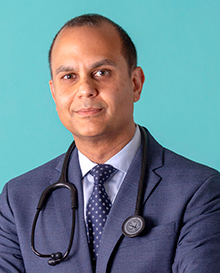Contact Us
The mild start to fall has led to a pretty mild flu season so far, says Dr. Suraj Saggar, Chief of Infectious Disease at Holy Name. But it likely won’t stay that way.
“As long as it stays warm, people aren’t spending time indoors,” he says. “But with people congregating at school, for Halloween, and over holidays, that lends itself to flu season taking off.”
If you haven’t gotten your flu shot yet, now’s the time, he says. Flu season has started, though it usually peaks in January and February. The season lasts all the way through May, but cases tend to drop in March once the weather gets warm again.
The vaccine changes each year based on the circulating strains of the flu; each year’s is developed after evaluating what’s currently going around in the southern hemisphere. Then, the strains of the flu in the northern hemisphere inform the next year’s flu vaccine for the southern hemisphere.
And contrary to what you might have heard, getting the flu shot does not give you the flu: The resulting fever, muscle aches, and other related symptoms people can experience after getting the vaccine are just your body’s way of getting ready to fight off the potential attacker. “That’s your immune system being activated,” Dr. Saggar says.
The consequences of not getting vaccinated are much more serious. While not deadly for the average person, the flu still causes about 30,000 deaths in the U.S. each year. It can also cause secondary bacterial infections, which are extra-hard on an immune system that just fought off the flu. The flu also sends many people to the ER: Be on the lookout for unrelenting fevers, shortness of breath, or rebound symptoms – starting to feel better only to feel sick again in the following days.
Dr. Saggar says Holy Name’s strong Infectious Disease team, collaboration with Emergency and Pulmonary Medicine teams, and use of advanced diagnostics make it especially well equipped to care for people who get the flu. But prevention is the best medicine, so protect yourself and others by getting vaccinated this fall.
Contact the Holy Name pharmacy for more information, and check in with your PCP to see what other vaccinations you may need.


